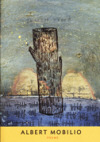Touch Wood
“ ropositions written broken-english wise,” the poet writes in “Average Reader,” a phrase that embodies this book’s essence and which characterizes what is most appealing about it, original syntax, a unique sense of what can be “english-wise.” Perhaps the poet imagines that this unique language is precisely what we need to survive: “you want to be saved,” Mobilio insists in the collection’s opening poem, “Touch Wood.” And how could we not be saved by such lines as “we lay down housed,” reminding us of the human capacity for invention, for creativity.
ropositions written broken-english wise,” the poet writes in “Average Reader,” a phrase that embodies this book’s essence and which characterizes what is most appealing about it, original syntax, a unique sense of what can be “english-wise.” Perhaps the poet imagines that this unique language is precisely what we need to survive: “you want to be saved,” Mobilio insists in the collection’s opening poem, “Touch Wood.” And how could we not be saved by such lines as “we lay down housed,” reminding us of the human capacity for invention, for creativity.
“ ropositions written broken-english wise,” the poet writes in “Average Reader,” a phrase that embodies this book’s essence and which characterizes what is most appealing about it, original syntax, a unique sense of what can be “english-wise.” Perhaps the poet imagines that this unique language is precisely what we need to survive: “you want to be saved,” Mobilio insists in the collection’s opening poem, “Touch Wood.” And how could we not be saved by such lines as “we lay down housed,” reminding us of the human capacity for invention, for creativity.
ropositions written broken-english wise,” the poet writes in “Average Reader,” a phrase that embodies this book’s essence and which characterizes what is most appealing about it, original syntax, a unique sense of what can be “english-wise.” Perhaps the poet imagines that this unique language is precisely what we need to survive: “you want to be saved,” Mobilio insists in the collection’s opening poem, “Touch Wood.” And how could we not be saved by such lines as “we lay down housed,” reminding us of the human capacity for invention, for creativity.
Mobilio is brilliantly inventive, exploiting beautifully poetry’s ability to make what we know unknowable and what we don’t know familiar, or at least recognizable: “I was reading out in the yard, / dyslexic sulk in place”; and “the whole of it is winged, this science / of speaking about large things”; and “we have / reason to tremble, and then alone”; and “a sudden mind / where all my war is done.” These poems convey a sense of urgency: “Don’t ask me // how much I need, how / purposeful I am”; and sometimes a muted sort of anguish: “my three maybe four ideas // under scrutiny, which isn’t / very desirable.”
Most ambitious are nine pages of linked poems “Letters from Mayhem,” all of which begin with a title/first line enclosed by a single right-sided half of a parenthesis, exhibiting the same muted anguish and searching as the collection’s other work: “In the temple of human reduction…I went unsought.” “Everything is difficult,” says Mobilio. (And these days, I admit it’s hard not to feel that way.)
I liked in particular the last poem in the collection, “Some Place, Same Place” which concludes:
I was telling you
about what I saw
in car windows,
about how we live
as if, and
as if.
I can think of no more apt way to describe the way we do live, or, in fact the way we read. As if a book of poems could change our lives, could save us (“you want to be saved”).





